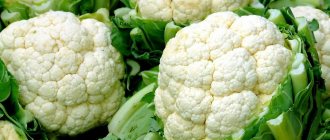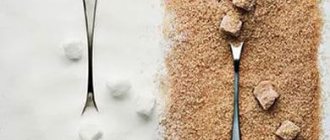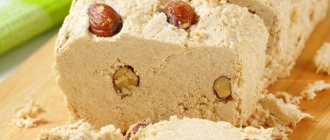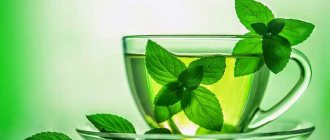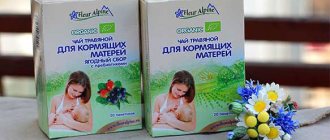When choosing a diet that is primarily beneficial for the baby, nursing mothers are faced with the question of milk consumption. When breastfeeding, goat's milk is considered along with cow's milk when comparing benefits. During lactation, the specifics of its use are often discussed in consultations with doctors. This is due to the mother’s desire to provide only healthy and harmless nutrition to her infant. It is especially important to understand whether a given product will cause an allergy and how the food will be absorbed by a fragile body. It is also worth knowing from what period mothers can use goat milk.
Goat's milk during breastfeeding - is it possible or not?
Many young mothers who breastfeed are forced to follow certain rules when compiling their diet. Some foods that were consumed without restrictions before the birth of a child are now strictly prohibited. That is why, when it comes to goat milk, nursing mothers wonder: is goat milk harmful when breastfeeding?
Goat's milk during lactation: benefit or harm?
Many pediatricians do not recommend adding goat's milk to the diet of children under one year of age. This is due to the excess of fats and minerals in this milk, which are difficult for the body of a small child to digest. This is precisely why many nursing women fear goat’s milk and worry about whether it can be drunk during lactation.
In fact, this product brings great benefits to the body of the young mother, and through her, to the child. Goat's milk is not identical to cow's milk; its composition is truly unique. It includes:
- a huge amount of vitamins (A, B, C, D and others);
- essential macro- and microelements.
Moreover, many vitamins are contained in enormous quantities - for example, in goat milk, cobalt, which is included in vitamin B12, is 6 times more than in cow milk.
Thus, by drinking just a little goat’s milk, you can satisfy the body’s need for vitamins, which is especially important in the spring and autumn, when many suffer from vitamin deficiency.
In addition, for normal functioning of the cardiovascular system, a nursing mother needs potassium, the content of which is very high in goat milk.
Allergy to a new product
Some believe that goat milk when breastfed can cause allergies in both the mother and her baby who drinks her milk.
However, this is misleading, since alpha-1s-casein, which provokes and triggers allergic reactions, is practically absent in this milk.
At the same time, it is found in cow's milk, which, on the contrary, is considered by many to be less “dangerous” during lactation.
The benefit of goat milk for a woman who is breastfeeding is also that it helps normalize the functioning of her digestive system. Due to the high content of beta-casein, milk is easily and quickly digested, and the proteins contained in it are broken down.
Some nursing mothers believe that such a drink is harmful because it is too fatty and will add extra calories to their diet, which is already more extensive than before the baby was born. However, you should not be afraid of the fat content of this product.
Despite having a higher percentage of fat content than cow's milk (the average fat content is 4.4%), goat's milk is absorbed almost completely. In addition, it contains almost 70% unsaturated fatty acids, which block the accumulation of cholesterol in the body, while cow's milk contains only 50%.
Thus, this product is useful for women who have recently become mothers and are breastfeeding their babies. There is practically no harm from taking it, so serious restrictions on the amount of milk you drink are unnecessary.
Advice
You need to start drinking goat milk after the birth of your baby a little at a time. In the first days, you should limit yourself to one or two glasses a day, and then, after making sure that there is no negative reaction from the body, you can increase the portions and frequency of intake. You can also add this drink to porridges during their preparation, cook milk soups and baked goods with it.
How to choose the right goat milk for breastfeeding women?
Despite the fact that goat milk is not dangerous and is even useful during lactation, a lot depends on its correct choice. If you buy a low-quality drink, it, like any other low-quality product, can be very dangerous to your health. For example, there is a risk of contracting brucellosis, a disease that is very dangerous for both mother and baby.
To eliminate the risk of disease, you need to follow the following tips.
- You can buy this product only in stores or markets where all sellers subject their goods to veterinary control before they hit the shelves. Under no circumstances should you make a purchase from strangers “out of pocket”.
- If you are not one hundred percent sure about the quality and origin of the milk you purchased, you must boil it before drinking. At the same time, the amount of nutrients in it will decrease slightly, but the risks to the health of the woman and her child will disappear. If you neglect this rule, you can end up in the infectious diseases department of the hospital and stay there for a long time, and for a newborn baby, infection with brucellosis through breast milk can be deadly.
- Good goat's milk has a pleasant smell and taste, although the taste is different from cow's milk. If the animal is kept in poor conditions and milking takes place in unsanitary conditions, then volatile fatty acids are released from the sebaceous glands of the goat, which give the milk an unpleasant smell and taste. Therefore, having bought a drink, before drinking you need to check how it smells and what taste it has.
When breastfeeding a baby, a woman needs to be especially careful about what she eats and drinks. Adding goat's milk to your daily diet will help enrich it, filling it with vitamins and other beneficial substances. However, you need to carefully select milk before purchasing to ensure it is safe to consume.
We recommend reading the following article: curdled milk and kefir during breastfeeding
Source: https://therebenok.ru/pitanie-mamy/koze-moloko-pri-grudnom-kormlenii.html
Features and disadvantages of goat milk
A huge amount of vitamins and nutrients are found in goat milk. It is not for nothing that it is recommended for children; it is difficult to overestimate the beneficial effects on the body.
Useful qualities of milk:
- strengthens defenses;
- supports hematopoiesis;
- increases hemoglobin content;
- contains little casein, which causes allergies;
- stimulates the thyroid gland;
- contains cobalt, which has a positive effect on metabolism;
- strengthens the heart;
- helps the nervous system work;
- increases performance;
- improves the functioning of the digestive system;
- helps with diabetes, tuberculosis, bronchitis;
- improves falling asleep, promotes deep sleep;
- normalizes the functioning of the digestive system after poisoning.
High fat content gives a unique taste, but this will be a disadvantage for feeding babies. There is no need to feed your baby exclusively goat's milk; there is a risk of developing colic and bloating. An adult may also develop an allergy to goat's milk. The content of a large number of biobacteria can trigger the fermentation process. This is unacceptable for intestinal pathologies, as well as diseases of the pancreas.
Can a nursing mother have goat milk?
Goat's milk during lactation: pros and cons
Goat products, in particular milk, are incredibly healthy, and almost everyone knows about it. This milk is easier to digest, does not cause allergic reactions, and has a beneficial effect on the human gastrointestinal tract.
Therefore, women who breastfeed their newborns often wonder if goat milk is good for breastfeeding.
After all, every mother worries about her diet so that her child receives the maximum amount of healthy vitamins and minerals through breast milk. Does goat's milk help improve lactation and breast milk quality?
Beneficial properties of goat milk product
Before you decide whether to drink goat milk during lactation, you should look at its vitamin composition:
- Goat milk contains a high percentage of protein, fat and calcium. Compared to cow's milk, goat's product is much more nutritious and fatty in this sense.
- Vitamins A, D, C and group B help improve immunity, and vitamin D helps the body absorb calcium in full.
- Vitamin E stimulates the formation of red blood cells, restores and maintains normal functioning of sexual functions, and prevents cell destruction.
- Vitamin H helps proteins to be fully absorbed, acts as a regulator of acid metabolism, and has a beneficial effect on skin health.
- Vitamin PP helps tissues and organs recover.
Other benefits of goat milk include:
- Goat milk contains a minimal amount of lactose, which not every human body can process.
- The product is an excellent energy drink.
- Normalizes digestion, does not cause diarrhea, bloating, flatulence.
- Has a hypoallergenic composition.
- Milk contains amino acids in quantities greater than those found in meat and fish.
Goat milk product is rich in chlorine, calcium, molybdenum and phosphorus, as well as lecithin, globulin and albumin.
And if you regularly consume goat milk, the following changes occur in the body:
- hormonal balance is restored;
- blood clotting is normalized;
- immunity is strengthened;
- prevents the development of oncology and diabetes;
- fluid balance is restored;
- mental activity improves;
- teeth and bones are strengthened;
- promotes the removal of uric acid from the body;
- the face acquires a healthy color;
- the skin becomes elastic;
- muscle tissue is strengthened and toned.
As a rule, a nursing mother can drink goat milk if she has problems such as:
- vascular diseases;
- acne;
- problems with the gastrointestinal tract;
- thyroid pathology;
- dry skin and hair;
- colds;
- migraine;
- insomnia;
- vitamin deficiency or hypovitaminosis.
Goat milk can be stored in the refrigerator for about 3 days. But still, in order to get the full vitamin content of this drink, it is better to drink fresh milk.
What harm can consuming goat's milk cause during breastfeeding?
The main argument against drinking goat milk is its individual intolerance. If the mother is breastfeeding, she can drink goat milk product. But there are 3 factors to consider:
- Insufficient folic acid content, which can cause anemia in a woman.
- An excess of minerals, which can cause stress on the kidneys and nervous system, and cause heart problems.
- Lack of lipase, which is responsible for the breakdown of fats. Therefore, there is a risk of developing gastrointestinal and liver pathologies.
It is also worth considering that sometimes fresh goat milk can become a source of an infectious disease such as brucellosis. And if the mother gets sick with this disease, the infant can also be infected, even if he is not fed this milk.
The disease is very insidious: it is transmitted from animal to person through milk, products prepared from it, or through objects that were accidentally exposed to the secretions of a sick animal.
Brucellosis affects the human central nervous system and cardiovascular system, which can lead to disability or death.
How to drink goat milk correctly during breastfeeding?
Judging by the harmful properties of goat's milk, the question may arise whether a nursing mother can have goat's milk. The answer is yes - you can. But it is important to follow simple rules:
- Choose only trusted product suppliers.
- Consume exclusively fresh milk.
- Start drinking goat milk a month after the baby is born.
- The first time before you decide to breastfeed, take a sip of goat's milk. For the next two days, watch to see if you and your baby experience any unwanted reactions to goat’s milk. If the experiment was a success, you can safely drink this drink.
- If your baby is an infant and you have not yet started feeding him complementary foods, dilute goat’s milk with water for yourself, gradually increasing the concentration of the natural drink.
- Be sure to boil the milk before use.
- It is not recommended to add goat milk product to coffee or tea.
No matter how safe and healthy goat milk is, a nursing mother should remember that while practicing breastfeeding, she should not drink more than 1-3 glasses of goat milk per day.
In addition, you need to drink the drink slowly, in small sips - this way the vitamin composition is better absorbed by the body.
But the main thing is to take care of your baby’s health: if the baby has an undesirable reaction to goat’s milk drunk by the mother, do not put him at risk, find a safe alternative to this drink.
← How to use a breast pump correctly? Can a nursing mother have watermelon and melon? →
by HyperComments
Other materials in the section
Source: https://jliza.ru/mame-koze-moloko.html
Comparison of goat and cow milk
The milk of these animals is beneficial for children and adults. At any age, phosphorus and calcium are needed, which are well absorbed from milk. They help in the formation and maintenance of teeth, cartilage, joints, and bones.
There are some differences between cow's and goat's milk. Goat is fattier, but is easily digested and absorbed. This is facilitated by special fatty acids in the composition. Goat milk contains less S1-casein, which provokes an allergy reaction. For this reason, intolerance to this product is rare.
Cow's milk contains more lactose. If a person does not digest this substance, he can switch to goat milk. Folic acid and vitamin B12, which are beneficial for development in childhood, are higher in cow's milk. But goat milk wins in terms of the presence of calcium, copper, and potassium, which are necessary for the development of internal organs.
Can I drink goat's milk while breastfeeding?
Goat's milk is safer than cow's milk, less likely to cause allergies and negative manifestations from the gastrointestinal tract. The product is easier to digest and contains a large amount of useful substances. Goat's milk during breastfeeding and mixed feeding fills the body with vitamins, minerals, and improves well-being.
Can a mother drink it during breastfeeding?
If you are allergic to cow's milk, pediatricians recommend replacing it with goat's milk, since the drink does not contain the alpha-1s-casein component. Regarding whether a nursing mother can have goat milk, the product is acceptable because it contains useful substances necessary for a quick recovery after pregnancy and childbirth. They are also needed by the child’s growing body.
From what month?
Goat milk is a valuable product for a nursing mother and baby; it is included in the diet after the child reaches 2 months of age. The drink is introduced gradually, carefully observing the baby’s reaction.
How is it useful for a woman?
The product contains vitamins and minerals that have a positive effect on the body. The composition is represented by another type of casein, which is lighter, faster to digest, and also rarely contributes to the manifestation of allergic reactions. Goat milk has the following properties:
- normalizes the functioning of the gastrointestinal tract;
- has a strengthening effect on the immune system;
- helps strengthen bones;
- strengthens tooth enamel;
- has a positive effect on the condition of hair and skin;
- promotes hematopoiesis, prevents the occurrence of anemia;
- cleanses the body of harmful substances and toxins;
- strengthens the nervous system, normalizes sleep.
Goat milk is also used for cosmetic purposes. The serum is used to make baths that soften calluses and cracked heels. Masks containing the drink strengthen hair, smooth it, and refresh the skin.
Is it allowed in baby food?
Knowing about the beneficial properties of goat's milk, mothers strive to introduce it into their baby's diet as early as possible. However, there is no need to rush, as exposing your child to the product too early can have negative consequences.
From how many months?
It is recommended to introduce your baby to goat milk after reaching 12 months of age. A child’s digestive system, which is not fully formed, will not be able to fully process the product due to its high fat content. Dysbacteriosis, excessive gas formation, and pain may occur.
It is possible to use the product diluted with water:
- up to 3 months mixed with water, ratio 1:3;
- up to 6 months – 1:2;
- up to 12 months – 1:1.
The baby is introduced to milk, starting with 50 ml, and then the reaction and general condition are observed for 2 days. If the drink causes an allergy, it is offered after 2-3 weeks. If negative manifestations occur again, it is recommended to discontinue the product for a longer period of time.
Benefits for the baby
Goat's milk has a positive effect on the child's body. Due to the content of a large number of microelements, the drink:
- strengthens bones, prevents the occurrence of rickets;
- quickly absorbed;
- less likely to cause allergies than cow's milk;
- increases immunity.
What is dangerous for mother and child?
The product is useful only when it is consumed in moderation. Exceeding the recommended volume leads to an overload of the body with minerals, which negatively affects the functioning of the kidneys and heart muscle.
The drink also contains a small amount of folic acid and vitamin D3, which are necessary for the normal functioning of the mother and child.
Therefore, it is not recommended to use it as the only source of vitamins, but to supplement it with other similar products.
The quality of goat milk directly depends on what the animal is fed and in what conditions it is kept. If grass or feed contains harmful components, they will end up in the product. In addition, milk can become a source of dangerous infections, one of them is brucellosis. It affects the cardiovascular and nervous systems and can lead to disability and even death.
Important! To make sure that the animal is healthy, it is recommended to check the veterinary passport. It lists all vaccinations received and diseases suffered.
How to properly introduce it into the diet?
Before introducing the product into your diet, it is recommended to consult a specialist. Start drinking it with one small sip; allergies may appear within 48 hours.
After drinking milk, carefully monitor the child’s condition.
If the baby feels well and has not developed a rash, dysbacteriosis, excessive gas formation or regurgitation, then continue to drink the drink, gradually increasing the volume to 1 tbsp./day.
Useful tips for selection and use
When including milk in your daily diet, it is recommended to adhere to the following rules:
- at first it is diluted in half with water, decreasing the proportion of water every day;
- drink milk 3-5 times a week, 1 cup per day: this volume is enough to provide the mother and child with all the necessary elements without overloading the gastrointestinal tract;
- Before use, the product must be boiled, even if purchased in a store;
- The shelf life of milk at room temperature is 24 hours, in the refrigerator – 48 hours, and a pasteurized product can last up to 5 days;
- The product should not be diluted with coffee or tea: this may negatively affect the functioning of the digestive system.
When choosing milk, pay attention to its production time and shelf life. The fresher the milk, the better. You should purchase it only from trusted sellers.
Goat milk is a healthy product that is recommended to be included in the diet of a nursing mother. They drink it gradually, carefully monitoring the baby’s condition. If a negative reaction occurs, the introduction of milk is postponed for some time.
Is it possible to drink goat's milk while breastfeeding? Link to main publication
Source: https://KashkaLop.ru/mama/pitanie-mamy/koze-moloko-pri-grudnom-vskarmlivanii
What are the benefits and harms for a baby from drinking goat milk by a nursing mother?
When choosing a diet that is primarily beneficial for the baby, nursing mothers are faced with the question of milk consumption. When breastfeeding, goat's milk is considered along with cow's milk when comparing benefits.
During lactation, the specifics of its use are often discussed in consultations with doctors. This is due to the mother’s desire to provide only healthy and harmless nutrition to her infant.
It is especially important to understand whether a given product will cause an allergy and how the food will be absorbed by a fragile body. It is also worth knowing from what period mothers can use goat milk.
Advantages
Consumption of goat's milk during lactation improves the quality of breastfeeding
Goat's milk has a number of differences from cow's milk.
- Contains more proteins and fats.
- More calcium, iron, magnesium.
- Highly rich in vitamin A.
- Contains better digestible small fat globules. Goat milk consumed by the mother during lactation is more easily absorbed by the baby due to the higher content of unsaturated fatty acids, which are more beneficial for the baby.
- The amino acid composition of goat's milk is similar to that of women's milk.
- It is safer because it reduces the likelihood of indigestion in a child.
Periods of pregnancy and lactation
Goat milk, recommended during pregnancy, provides the female body with useful substances.
- It has an invaluable effect on the formation of the fetal skeletal system.
- Vitamins B1, B12, B2, C, A, especially during periods of vitamin deficiency, are necessary for the mother and the intrauterine development of the child.
- Vitamin D, together with calcium, will protect hair, bones and nails from destruction.
Experts advise sticking to breastfeeding for up to a year. During this period, only mother’s milk is the most beneficial for a child. Goat's milk directly improves the quality and benefits of breast milk. Properties are improved: fat content, nutritional value and production increase.
Basic rules of use
Goat milk products are healthy and tasty
- A new product should be introduced into the mother’s diet carefully and only if the baby has a calm reaction and healthy absorption.
- When breastfeeding, it is advisable for a woman to drink goat milk one glass a day. If the mother did not drink goat milk before pregnancy, then when adding it to the diet of a nursing mother, the following recommendations should be followed.
- Do not take risks and consume milk from the second month of the child’s life, because in the first month there is a greater likelihood of a negative reaction. After this period has expired, the nursing mother can try milk in small quantities.
- It is worth carefully assessing the child’s reaction to changes in the taste qualities of breast milk, whether they will be too strong for the baby, as this may provoke breast refusal.
- For two days after the mother drinks milk for the first time, you need to closely monitor the baby. Allergic reactions, rash or bloating will be a signal that you should not change your usual diet.
Kids' reaction
For a fragile child's body, digesting goat's milk is too much of a burden, even though it is easier to break down and absorb than cow's milk.
- Due to the high fat content, there may be disturbances in the child’s digestive tract in the form of indigestion, abdominal colic and bloating.
- A large amount of phosphorus in milk is undesirable for the baby’s kidneys, as it interferes with the absorption of calcium and vitamin D.
- It is recommended to give goat milk to babies only when bottle-fed, adhering to certain rules.
- Add to the diet approximately from the seventh month of life,
- The fat content of milk for feeding infants should not be more than 2%, so milk should be diluted with clean drinking water. For a trial period of about two weeks, the ratio is one part milk to three parts water. If tolerated by the child, it can be given 1:1.
- The amount of diluted liquid at a time during trial use should be no more than 20 ml and no more than 100 ml for constant use.
Precautions
The taste and smell of such milk are specific, although if hygiene rules are observed when caring for the animal, all this is reduced to a minimum. Animals must undergo veterinary control. Mom should follow the rules when purchasing and preparing.
- When purchasing milk from farms or private households, you should pay attention to documents such as health passports and veterinary certificates.
- When buying milk in stores, be sure to check the expiration date.
- When buying farm milk and before drinking, you should check the smell and taste to exclude sour milk.
- Bring milk to a boil before eating to minimize risks for mother and baby due to pathogenic lactic acid bacteria.
Thus, for nutrition planning, a nursing mother can be recommended to give preference to goat’s milk, following the recommendations for selection and preparation. Being well digested by mother and child, it will bring invaluable benefits to the health and proper development of the baby.
Source: https://prochado.ru/grudnoe-kormlenie/gv-produkty/koze-moloko-pri-grudnom-vskarmlivanii.html
The place of the goat “gift” in the diet of infants
All pediatricians unanimously “shout” to the whole world that until the baby is six months old, it is necessary to breastfeed exclusively. Unfortunately, it may happen that a nursing woman either has insufficient or no lactation at all. What to do? Formulas come to the rescue, but you still want to feed your child natural and healthy food. If you choose between milk from large or small livestock, then give preference to the latter. A child can safely try cow's milk only after 2 years.
If you decide to supplement your baby with goat milk instead of formula, then remember a few rules:
- If you take country goat milk, make sure the goat is healthy. Don’t hesitate to inquire about the animals’ vaccinations and past illnesses. Tests for latent mastitis must be carried out; goat blood and milk must be submitted in a timely manner to a veterinary laboratory for research to exclude dangerous diseases. The animal must also be examined for helminths. Don't risk your child's health. Do you buy it in a store? Check the expiration dates and storage conditions, and try it yourself before use to avoid souring.
- Boil even store-bought goat milk. Do not give it to your baby in its pure form. Be sure to dilute with boiled water. The fact is that a baby should not be given milk with a fat content of more than 2%. But often the recommended ratio between “white gold” and water is 1 to 1. A single volume should not exceed 100 ml - this is an already diluted and ready-to-use portion.
- Introduce gradually. For the first time, give only 20 milliliters for testing. And dilute it like this: 2 parts water and 1 part drink. Take a break for a day to assess the child’s well-being: are there any changes, has a rash appeared, or has the stool changed? If everything is fine, slightly increase the daily volume of dairy product. Do not introduce into the diet too early. It can be given only when the child reaches nine months of age, and to artificial children - a little earlier.
Goat's milk during breastfeeding: benefits or harm for mother and baby
› Nutrition › The benefits of goat milk for mother and baby during breastfeeding
For many years, there have been discussions about the benefits and harms of goat milk. Some consider this product incredibly useful, others speak out about its excessive fat content.
However, increasingly, doctors are inclined to believe that goat milk is indeed very nutritious and valuable for humans.
Can a nursing mother drink this drink? How will the baby’s body react to it, and can he have allergic reactions?
Compound
Goat milk contains a large amount of vitamins and minerals. Compared to cow's milk, it is considered more nutritious and valuable.
It contains vitamins D, C, A, B vitamins, beta-casein, calcium, potassium, sodium, iron. Dairy products based on goat milk are considered non-allergenic.
Undesirable reactions in an infant to these products may occur in rare cases if the child is highly prone to allergic reactions.
This type of food is absolutely unacceptable for a child. An increased fat content can affect the functioning of the baby’s stomach and intestines, so there is no need to include it as complementary food for the baby.
If a nursing mother absolutely needs to get all the nutrients from goat milk, she can include it in her diet.
However, it should be remembered that any new product must be included in the diet gradually.
Milk during lactation
Goat milk has a rather specific taste and smell. For people who regularly eat it, this is not a problem.
However, if you have never tried this product, you may not like it the first time. The same thing can happen to a baby.
Goat's milk entering your body during breastfeeding can change the taste of breast milk. The baby may refuse the breast.
If you nevertheless decide that without this product your own milk is not healthy enough, the nursing mother needs to introduce the drink into the diet as carefully as possible.
First, try adding it to tea and see how your baby reacts during the day. If your baby does not have a rash or bloating, you can drink the undiluted drink little by little.
In general, a nursing mother is not recommended to get carried away with foods that are new to her. There is no need to chase fashion or, on the advice of friends, stuff yourself with very valuable but unusual delicacies.
This can negatively affect not only the child’s health, but also your own.
For this reason, doctors advise to refrain from unusual foods and drink goat milk when breastfeeding a mother only if it is familiar to her.
Selection rules
Both cow's and goat's milk can contain dangerous bacteria. In dairy products, various microorganisms develop very quickly. And even if you bought village milk in the morning, by lunchtime it can already be hazardous to your health. In order to avoid contamination by pathogenic bacteria, milk must be boiled.
If you buy milk from a farm, make sure the animals are healthy. Each individual must have a passport, which indicates all the vaccinations that were given to the animal. A domestic goat must also have a health passport.
When buying a product in a store, do not be lazy and look at the packaging and expiration date of the milk. Even when purchasing store-bought milk, you need to boil it at home.
If you want to get the most benefits from this product, it is better to buy goat's milk cheese or yogurt.
By the way, many famous varieties of Swiss cheese are made from goat milk.
Is it possible to give it to a child?
Doctors do not recommend giving your baby pure goat's milk until one year of age. The baby’s digestive tract simply cannot cope with digesting such an amount of fat, which means that such phenomena as stool upset, increased gas production and abdominal pain will invariably occur.
If absolutely necessary, you can give this product to a child from 6 months in diluted form. Goat milk should be diluted in a 1:1 ratio with boiled water. You shouldn't get carried away with this product either. At one time, a child can be given no more than 100 ml of diluted milk.
Read also:
Can a mother have sugar while breastfeeding?
Interesting
According to legend, it was the goat that fed Zeus himself. In ancient Greece and Rome, the goat was considered a sacred animal, and its milk was used as a cure for many ailments. Avicenna himself prescribed this product to his patients with spleen diseases. Women of those times washed their faces with it, believing that it gave youth and beauty.
Of course, a nursing mother wants to give her baby all the most useful things so that the child grows up healthy and healthy.
However, it should be remembered that the most appropriate nutrition for a baby is mother’s milk and its value cannot be replaced by goat’s or cow’s milk.
In order for your milk to be as healthy as possible, eat right, avoid stress and enjoy life. In this case, your baby will definitely grow up strong and healthy.
(1 vote(s), result: 5.00 out of 5) Loading…
Source: https://yaposlerodov.ru/pitanie/koze-moloko-pri-grudnom-vskarmlivanii.html
Is it possible for a nursing mother to goat milk?
Every young mother wants to give her baby only the best. When a child feeds on breast milk, the issue of forming his own diet becomes especially acute.
After all, it is very important to eat nutritious, healthy food that will not harm the baby. In addition, mommy wants the food to be varied and tasty.
Is it possible to drink goat's milk during lactation? You will find the answer to this question in this article.
Beneficial features
According to ancient Greek legends, the supreme deity of the Olympic pantheon - the thunder god Zeus - was fed with the milk of a sacred goat. Avicenna (a famous Persian doctor) recommended the product to people suffering from spleen diseases: he believed that this product contributed to a speedy recovery.
And this is not surprising, because nutritionists have proven that goat's milk is more nutritious than cow's milk. It rarely provokes allergic reactions, which is extremely important for young mothers. In addition, it contains valuable vitamins and microelements.
It is important that, despite its fairly high fat content, it is quickly absorbed and, unlike other fatty foods, does not complicate the digestive process.
Doctors recommend drinking fresh goat milk while breastfeeding, as it has a number of unique properties:
- strengthens bones and is an excellent prevention of rickets;
- normalizes the functioning of the digestive tract;
- helps avoid anemia and promotes hematopoiesis: goat's milk during breastfeeding is highly recommended for nursing mothers who have experienced difficult childbirth and lost a lot of blood;
- strengthens the immune system;
- improves the condition of hair and skin, which is extremely important for women who have recently given birth and want to regain their attractiveness as soon as possible;
- helps strengthen tooth enamel. This property of the product is very important for young mothers, because during pregnancy and lactation, calcium “leaks” from the woman’s body to the child, so the teeth of pregnant and lactating women tend to deteriorate greatly. Goat's milk during breastfeeding can solve this problem;
- helps get rid of constipation and flatulence;
- stimulates the functioning of the nervous system: regular consumption of goat’s milk normalizes sleep and improves mood;
- removes harmful substances and toxins from the body.
It has also been proven that its regular use helps to avoid the development of malignant neoplasms. This is a scientifically established fact
By the way, you can also use it as a cosmetic product. If you regularly wipe your face with a cotton swab moistened with a small amount of this product, you can become the owner of soft, elastic, youthful skin.
True, the product also has one drawback. Due to its peculiar taste, many people find it quite unpleasant. Nevertheless, you can get used to its unusual taste quite quickly. In addition, in stores you can buy a pasteurized product that has a fairly soft, delicate taste.
How to use during lactation?
During breastfeeding, goat's milk can be an excellent addition to a woman's daily diet. However, in order not to harm the baby, it is important to follow the following recommendations:
We recommend reading: Milk tea for nursing mothers
- start drinking it while breastfeeding a month after the baby is born;
- start using it with one small sip. Typically, food allergies in infants appear within the first 24 hours after a nursing mother eats a new food. If after 24 hours the baby feels well, he does not have diarrhea, colic or bloating, he does not spit up more than usual and does not worry, you can safely drink a glass a day while continuing breastfeeding;
- first dilute it with water in a ratio of 1 to 1. Gradually, the volume of water can be reduced until it is completely eliminated;
- drink no more than one glass a day three to five times a week: this volume allows you to provide the body with vitamins, proteins, fats and microelements in sufficient quantities and does not burden the digestive system of the infant;
- buy only a high-quality product: a nursing mother should under no circumstances skimp on her nutrition. It is advisable to choose it from farmers who have all the necessary quality certificates;
- you should not add it to coffee or tea: this can have a bad effect on the functioning of the digestive system of both mother and child;
- Remember that it can be stored at room temperature for 24 hours. After this period, a nursing mother should under no circumstances try it. If fresh is stored in the refrigerator, it can be consumed within 48 hours, but pasteurized will remain fresh for up to five days.
The main rule is the gradual introduction of any new products into the diet of a nursing mother.
Young mothers who have never drank it before or are prone to food allergies should be especially careful. Perhaps it is advisable for them to completely abandon this healthy product and drink a more familiar cow's milk (of course, in the absence of casein intolerance).
How to choose?
Any milk, both cow's and goat's, may contain bacteria that are dangerous for mothers and infants. At the same time, they multiply quite quickly: after standing for just two days at average room temperature, the drink becomes unsuitable for consumption. Therefore, you should not purchase it from unverified places. After purchasing it, you need to boil it thoroughly.
If you purchase a product from farmers, make sure that the animal does not suffer from any diseases. Each goat must have a veterinary passport, which lists the vaccinations given to the animal. Do not hesitate to ask to see this passport: it is important for you to take care not only of your health, but also of the health of your baby.
Buying goat milk for a nursing mother at the supermarket? Carefully study the expiration date of the product. Naturally, the fresher the milk, the better it is for your health. Even if you bought it at the supermarket, be sure to boil it before using it!
By the way, if you want to get the maximum benefit from it and you are not intolerant to this product, pay attention to goat cheese or yogurt!
How to choose a quality product
To avoid possible harm from the use of dairy products, it is necessary to take a responsible approach to their choice. When buying secondhand or from a farm, it is better to choose trusted suppliers with good reviews from friends. People who try goat milk for the first time often do not like its taste and smell. With proper care and hygiene of keeping animals, milk should not have any foreign tastes or odors.
Like any animal whose products are sold, a goat must have a veterinary passport. Do not hesitate to ask the seller - the health of mother and baby should come first.
When purchasing, make sure the milk is fresh, since without boiling and pasteurization it can be stored for no more than a day. In stores and supermarkets, pay attention to the expiration dates of the product and its storage conditions. It is better to choose milk in a tetra pack or glass bottle if it must be stored in the refrigerator. The composition should not contain any foreign additives or impurities.

